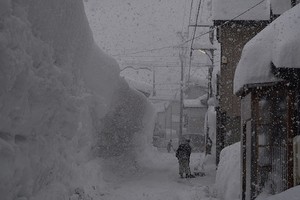April 19, 2021 at 13:00 JST
 Prime Minister Yoshihide Suga and U.S. President Joe Biden walk to attend a news conference in the White House on April 16 in Washington. (The Asahi Shimbun)
Prime Minister Yoshihide Suga and U.S. President Joe Biden walk to attend a news conference in the White House on April 16 in Washington. (The Asahi Shimbun)
There is no doubt about the importance for Japan to maintain close cooperation with the United States.
But Japan cannot protect its own peace and security by simply serving as a part of Washington’s strategy for responding to challenges posed by China.
Tokyo needs to map out its own strategy for dealing with China’s growing might. Its strategic focus should be on preventing the dangerous escalation of the confrontation between the two leading powers through joint diplomatic efforts with the United States and other countries concerned.
Prime Minister Yoshihide Suga and U.S. President Joe Biden held their first face-to-face talks on April 16 in Washington.
Their joint statement issued after the meeting underscored their strong stance toward China, stating their opposition to “any unilateral attempts to change the status quo in the East China Sea,” in an apparent warning against Beijing’s provocative activities around the Senkaku Islands.
The document also said, “We reiterated our objections to China’s unlawful maritime claims and activities in the South China Sea,” where China is locked in territorial disputes with its neighbors.
Biden’s choice of Suga as the first foreign leader to meet face to face after taking office was based on his recognition of the highly important role Japan plays in his strategy to counter China, which he views as “the only competitor” that could threaten the U.S.-led world order.
The two leaders’ agreement on bilateral cooperation to ensure the security and openness of fifth-generation (5G) wireless networks and other cutting-edge technologies also reflects Washington’s strategic rivalry with Beijing.
For Japan, solid backing from the United States is vital for responding to expanding Chinese activities around the Senkaku Islands. But the fact remains that Japan and China are neighbors with strong, interdependent economic relations. Tokyo’s stance toward China cannot mirror that of Washington's.
China has been expanding its military operations around Taiwan, while the Biden administration has made a clear commitment to supporting the island. Against this security backdrop, the joint statement referred to “the importance of peace and stability across the Taiwan Strait.”
This is the first reference to Taiwan in the official statement issued jointly by the leaders of the two countries since Japan established formal diplomatic relations with China in 1972. The fact has huge implications.
Should a security emergency occur around Taiwan, Japan could be pulled in. The Japanese government would likely be asked to provide logistical support to the U.S. forces responding to the crisis as security legislation enacted in 2015 allows Japan to do so “in a situation that has an important influence on Japan’s peace and security.”
The Suga-Biden statement also says the two countries “recognized the importance of candid conversations with China” and “encourage the peaceful resolution of cross-Strait issues.”
The two countries should match these words with actions. Japan, for its part, should focus on diplomatic efforts to press for self-restraint by both sides and avoid any armed conflict in the region.
Suga and Biden stressed that they share such universal values as freedom, democracy and human rights and pledged joint efforts to tackle such global challenges as climate change and the COVID-19 pandemic.
They did what they had to do by expressing “serious concerns regarding the human rights situations in Hong Kong and the Xinjiang Uyghur Autonomous Region” and vowing to press for the Myanmar military and police to immediately halt their violence against civilians.
But we cannot support their shared view about the ongoing project to relocate Marine Corps Air Station Futenma in Okinawa Prefecture to the Henoko district of Nago, also in the prefecture, in the face of clear opposition from local residents.
We cannot agree with their assertion that the construction of a Futenma replacement facility at Henoko is “the only solution that avoids the continued use of” the air base.
Japan and the United States have a clear common interest in pursuing a healthy coexistence with China through dialogue while taking steps to pressure Beijing out of actions that challenge the existing order.
The two nations also need to lead international efforts to tackle global challenges while getting China involved as well. We hope the two leaders will deeply understand that the true value of the Japan-U.S. alliance as a public asset for the international community lies in the vital role it can play in achieving these objectives.
--The Asahi Shimbun, April 18




















A peek through the music industry’s curtain at the producers who harnessed social media to help their idols go global.
A series based on diplomatic documents declassified by Japan’s Foreign Ministry
Here is a collection of first-hand accounts by “hibakusha” atomic bomb survivors.
Cooking experts, chefs and others involved in the field of food introduce their special recipes intertwined with their paths in life.
A series about Japanese-Americans and their memories of World War II